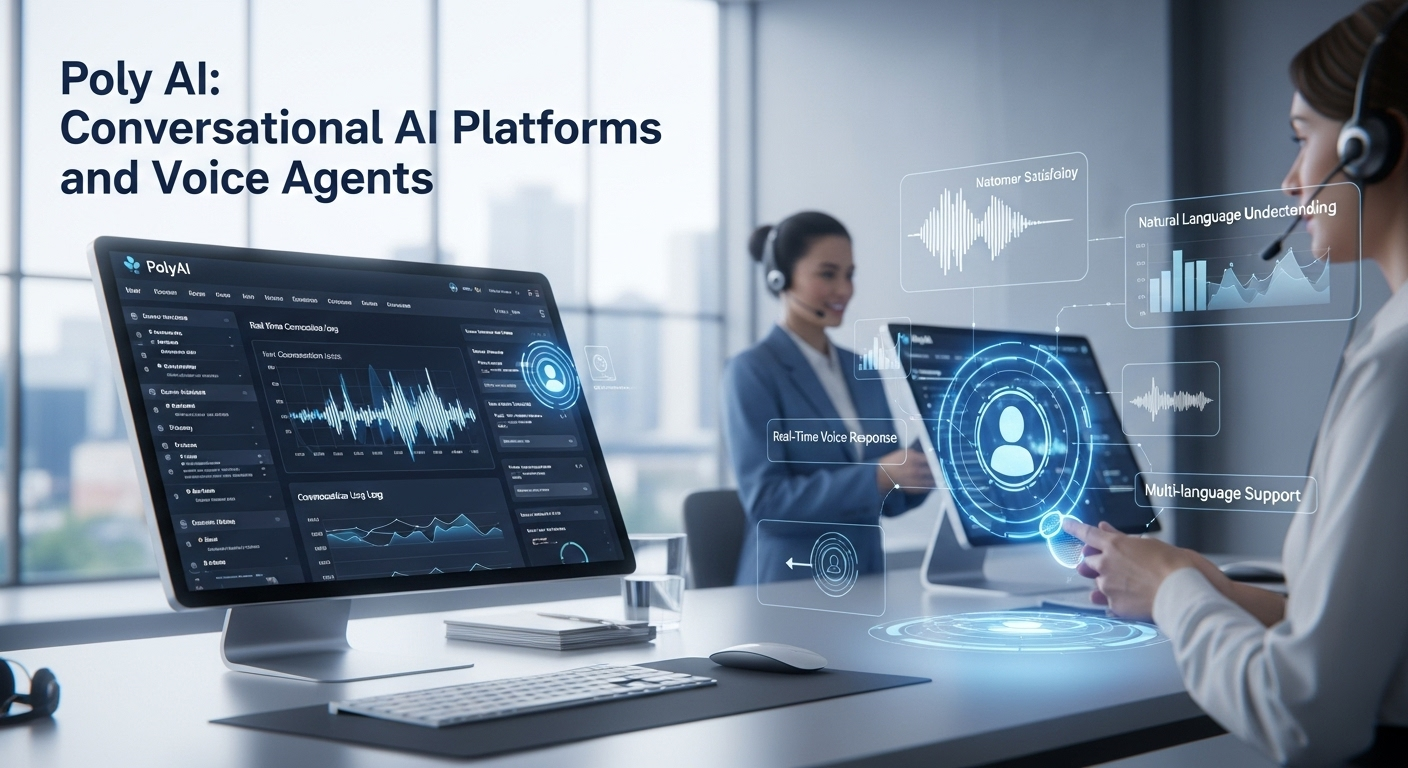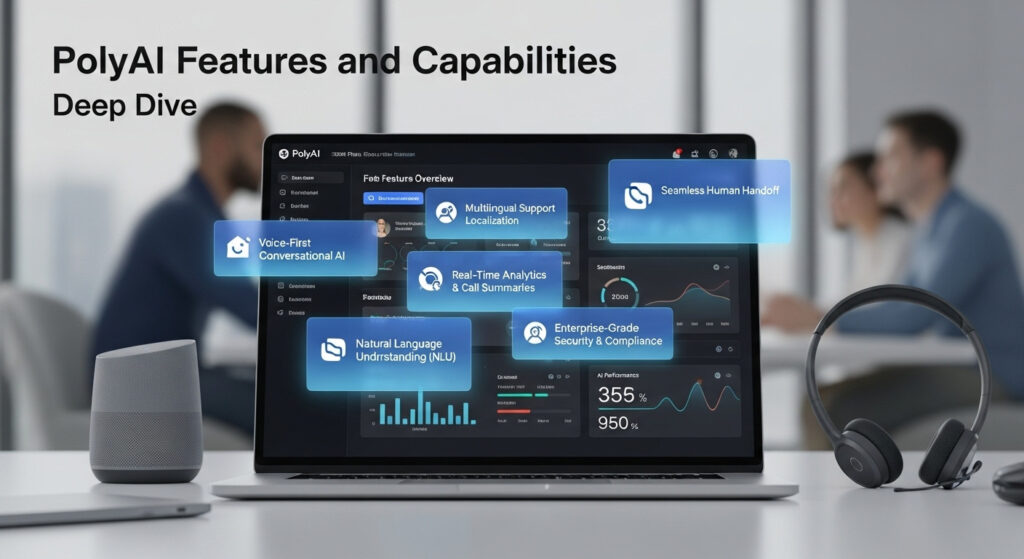
10 Best Nintendo Switch Games: The Ultimate Guide for 2025
- Gaming Updates

The conversational AI market is experiencing explosive growth, with voice assistants now handling 67% of customer service interactions across major enterprises. However, if you’ve been researching “Poly AI,” you’ve likely encountered confusion between different platforms sharing similar names.
This comprehensive guide cuts through the noise to deliver everything you need to know about Poly AI technologies, from enterprise grade voice agents to consumer chatbot applications.
Whether you’re an enterprise decision maker evaluating conversational AI solutions or a developer exploring voice agent platforms, this article provides definitive answers about PolyAI’s enterprise platform, consumer Poly AI applications, implementation strategies, pricing models, and competitive positioning.
The term “Poly AI” encompasses multiple distinct platforms that serve different markets and use cases. Understanding these differences is crucial for making informed decisions about which solution aligns with your specific needs.
PolyAI represents the enterprise focused arm of conversational AI, founded in 2017 by researchers from the University of Cambridge. This platform specializes in creating sophisticated voice agents designed specifically for customer service operations. The company has established itself as a leader in voice first conversational AI, earning recognition on Forbes AI 50 list in 2023 and receiving Cool Vendor status from Gartner for Conversational AI.
The core technology behind PolyAI centers on advanced natural language processing capabilities that enable voice agents to handle complex customer inquiries with human like understanding. PolyAI voice agents successfully resolve up to 90% of customer service inquiries without human intervention, significantly reducing operational costs while improving customer satisfaction scores.
The consumer market features several AI platforms using variations of the “Poly AI” name, with PolyBuzz representing the most prominent example. These applications focus on entertainment, personal assistance, and character based conversations rather than enterprise customer service operations.
Consumer Poly AI platforms offer AI-powered chatbots that users can customize for various personal interactions. These applications typically feature character creation tools, personality customization options, and conversational gameplay elements designed for entertainment and personal connection.
PolyAI’s enterprise platform offers a comprehensive suite of features designed to handle demanding customer service scenarios.

PolyAI’s NLP engine processes conversational inputs with remarkable accuracy and contextual understanding. The technology goes beyond simple keyword recognition to comprehend intent, emotion, and conversational context throughout extended interactions. The system supports multiple languages and regional dialects, enabling global organizations to deploy consistent voice agent experiences across diverse markets.
PolyAI excels through comprehensive omnichannel integration capabilities. The platform connects with existing phone systems, web chat interfaces, and mobile applications while maintaining conversation context when customers switch between channels. Integration with popular CRM systems and helpdesk platforms ensures voice agent interactions sync seamlessly with existing customer records.
PolyAI addresses technical complexity through its intuitive no code design interface. The drag and drop interface provides pre built conversation templates for common customer service scenarios, enabling non technical team members to design, modify, and deploy sophisticated conversational workflows without programming expertise.
PolyAI provides comprehensive analytics including real time conversation insights, customer satisfaction metrics, and performance optimization recommendations. ROI tracking capabilities quantify business impact through detailed cost analysis and efficiency measurements.
Implementing Poly AI can transform customer service operations by automating high-volume inquiries with conversational AI. This SEO and geo-optimized guide provides a detailed, actionable roadmap for businesses in the USA, UK, Canada, and beyond, ensuring maximum visibility and relevance for search terms like “Poly AI implementation guide,” “Poly AI setup,” and “Poly AI pricing 2025.”
Effective Poly AI implementation starts with strategic planning tailored to your business needs. Follow these steps to ensure a smooth rollout:
Poly AI’s no-code platform simplifies setup, but thorough configuration ensures optimal performance across diverse markets like the USA, UK, and Australia.
A phased launch and continuous optimization are critical for long-term success, especially for businesses targeting global or local markets.
Understanding Poly AI’s pricing is crucial for budgeting and evaluating ROI, whether you’re a small business in Austin or an enterprise in Singapore.
Poly AI offers custom pricing for enterprises based on:
Typical Costs:
For smaller businesses or individual users, Poly AI offers subscription-based plans:
Poly AI’s advanced conversational voice AI is transforming how organizations of all kinds interact with customers, automate workflows, and improve service quality.
Organizations deploy voice agents to handle routine inquiries, achieving 40-60% cost reductions while maintaining customer satisfaction. The 24/7 availability addresses customer expectations for immediate support across all time zones with consistent performance levels.
Healthcare organizations leverage PolyAI for patient intake automation, appointment scheduling, and symptom assessment tools while maintaining HIPAA compliance and ensuring patient privacy protection.
Financial institutions deploy PolyAI for account inquiries, fraud detection assistance, and payment processing support. Integration with core banking systems provides real time, accurate information while maintaining security protocols.
Retail organizations utilize PolyAI for order tracking automation, product recommendations, and return processing. Integration with inventory systems provides accurate product availability and restock notifications.
Understanding the distinction between Enterprise Poly AI and Consumer Poly AI is crucial for selecting the right AI solution for your needs. While both leverage conversational AI to automate and enhance voice interactions, their design, capabilities, and applications vary significantly.
| Category | Enterprise Poly AI | Consumer Poly AI |
|---|---|---|
| Audience | Large organizations, regulated industries | Small businesses, service providers |
| Security/Compliance | Advanced, enterprise grade | Standard, consumer level |
| Customization | High: workflows, branding, integrations | Moderate: templates, limited options |
| Analytics | Comprehensive, real time, business insight | Basic, feedback focused |
| Scalability | Global, millions of interactions | Local/small scale |
| Typical Use Cases | Account management, workflow automation, complex routing | Scheduling, payments, answering FAQs |
| Deployment | Custom, IT led, lengthy onboarding | Quick setup, self serve |
PolyAI emphasizes turnkey deployment with minimal technical overhead, while Microsoft Bot Framework provides comprehensive development tools for organizations with significant technical resources. Integration ecosystems differ, with PolyAI focusing on customer service while Microsoft leverages the broader Office 365 ecosystem.
What is the difference between PolyAI and other Poly AI apps?
PolyAI (poly.ai) represents an enterprise conversational AI platform for customer service, while applications like PolyBuzz target consumers with entertainment focused chatbot experiences. Key differences include pricing models, feature sets, and integration capabilities designed for different use cases.
How much does PolyAI cost for enterprise implementation?
PolyAI pricing follows a custom model ranging from $50,000-$500,000 for setup with monthly fees of $10,000-$100,000 based on usage volumes and requirements. ROI typically shows 6-18 month payback periods through operational cost savings.
Can Poly AI integrate with existing customer service systems?
Yes, PolyAI offers comprehensive integration with popular platforms including Salesforce, Zendesk, and ServiceNow through API connections and real time data exchange capabilities.
What languages does Poly AI support?
PolyAI supports multiple languages including English, Spanish, French, German, Italian, Portuguese, Mandarin, and Japanese, with cultural adaptation for regional business practices.
How long does it take to implement PolyAI for customer service?
Implementation typically requires 8-24 weeks depending on complexity, including planning (2-4 weeks), integration (4-8 weeks), testing (2-4 weeks), and deployment (2-3 weeks).
The decision between enterprise PolyAI and consumer Poly AI applications depends on your specific requirements and operational objectives. Enterprise organizations seeking customer service optimization will find PolyAI’s sophisticated voice agents provide compelling value through advanced integration capabilities and scalable deployment options.
Consumer users exploring conversational AI for entertainment or personal assistance may find consumer Poly AI platforms better suited through accessible pricing and personalization features that prioritize engagement over business automation.
Success factors include clear objective definition, realistic expectation setting, comprehensive planning, and commitment to ongoing optimization based on performance data and user feedback. Ready to explore how Poly AI can transform your operations? Start by defining your requirements, evaluating your infrastructure, and requesting platform demonstrations showcasing capabilities most relevant to your use cases.
Poly AI is a leading enterprise voice AI platform that transforms customer service by automating over 50% of inbound calls with natural, human like conversations. It supports multilingual interactions, integrates seamlessly with existing systems, and continuously learns to improve performance.
Trusted across industries like banking, healthcare, hospitality, and utilities, Poly AI enhances operational efficiency, customer satisfaction, and revenue generation while ensuring enterprise grade security and compliance. Its rapid deployment and real time analytics make it a forward looking solution for voice automation.